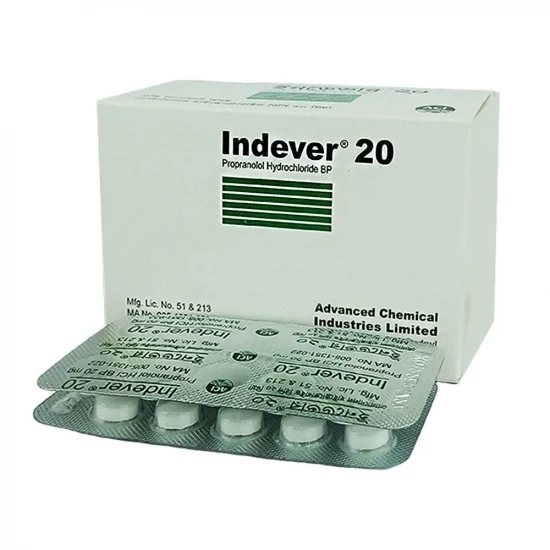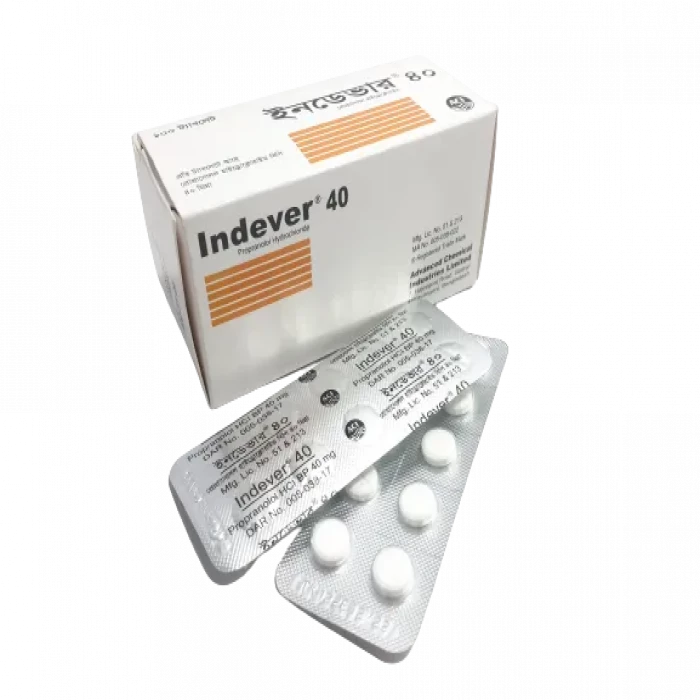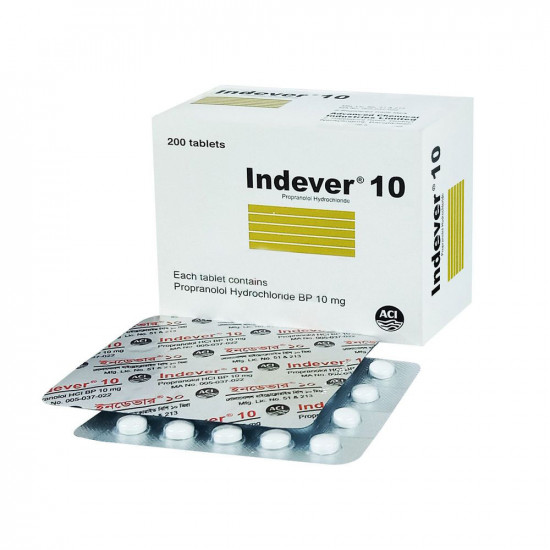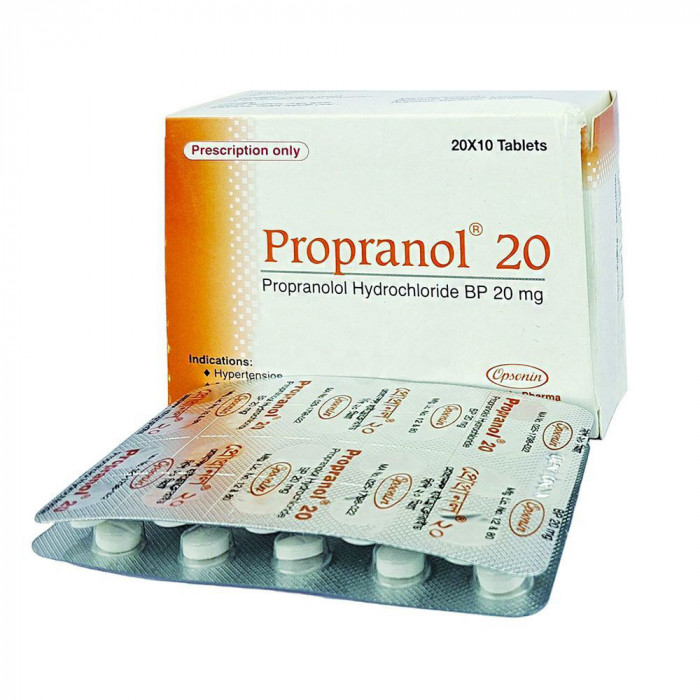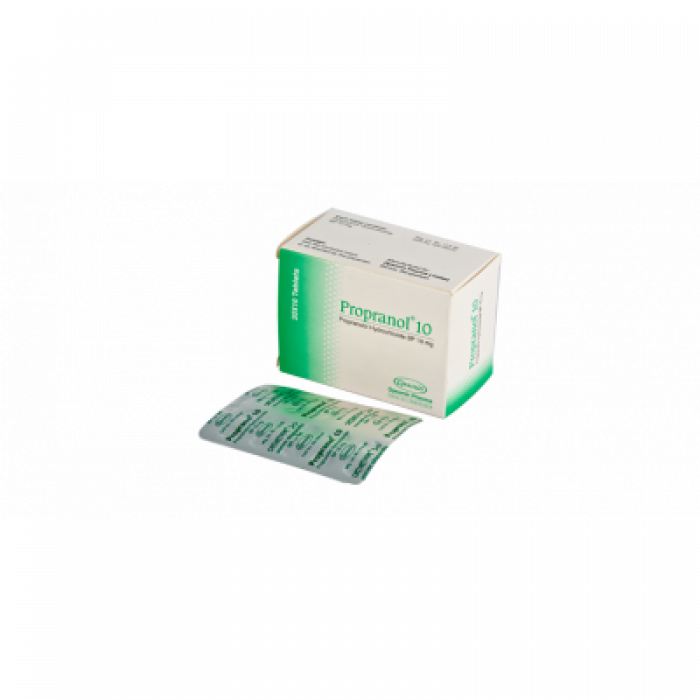
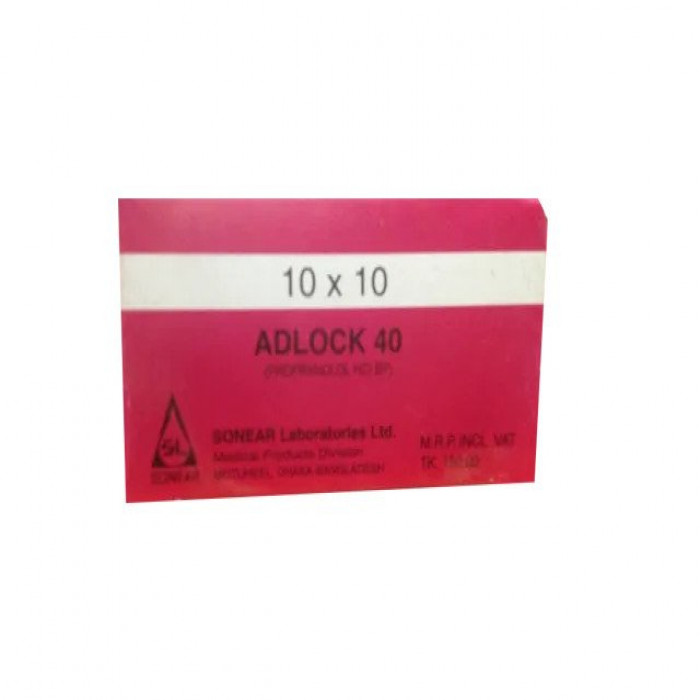
✔ 100% Authentic Product
👁️ Currently Viewing 5199
Adlock 40mg Tablet 10Pcs
Adlock 40mg Tablet (Propranolol Hydrochloride) is a beta-blocker medication used to treat high blood pressure, heart-related chest pain, heart rhythm disorders, migraine headaches, and tremors. By relaxing and widening blood vessels, propranolol hydrochloride helps lower blood pressure, reduce the risk of heart attack and stroke, and treat arrhythmia.
Adlock 40mg Tablet is usually taken orally with or without food, as directed by a physician. It is important to swallow the whole tablet with a glass of water and not to crush, chew or break it. Common side effects of propranolol hydrochloride may include fatigue, breathlessness, nausea, vomiting, diarrhea, and sleep disturbances, which are usually mild and short-lived. If these side effects persist, it is important to contact your doctor.
It is not recommended to stop taking Adlock 40mg Tablet without consulting your doctor, as it may cause changes in your heart rhythm and blood pressure. Consult your doctor before taking Propranolol Hydrochloride if you are pregnant or breastfeeding. Propranolol Hydrochloride may cause dizziness, so it is important to be cautious while driving. Alcohol consumption should be avoided while taking propranolol hydrochloride, as it may cause increased dizziness. It is important to keep your doctor informed about your health condition and medications to avoid any interactions.
Discount
Price: ৳ 27
MRP:
৳
28
5%
Off

100% Genuine Products, Guaranteed

Safe & Secure Payments, Always

Fast, Secure & Efficient Delivery

Proper Packaging
 Cash on Delivery - All over Bangladesh
Cash on Delivery - All over Bangladesh Regular Delivery - 12-24 Hours, Dhaka City* Charge Tk.39-59
Regular Delivery - 12-24 Hours, Dhaka City* Charge Tk.39-59 Regular Delivery - 24-48 Hours, Other Cities* Charge Tk.99-110
Regular Delivery - 24-48 Hours, Other Cities* Charge Tk.99-110
🌙 রমযান অফার 🌙
 ফ্রি ডেলিভারিঃ - ৭৯৯ টাকা+ অর্ডারে, ঢাকা
শহরে
ফ্রি ডেলিভারিঃ - ৭৯৯ টাকা+ অর্ডারে, ঢাকা
শহরে ফ্রি ডেলিভারিঃ - ২৭৯৯ টাকা+ অর্ডারে, ঢাকার
বাহিরে
ফ্রি ডেলিভারিঃ - ২৭৯৯ টাকা+ অর্ডারে, ঢাকার
বাহিরে
📲 মোবাইল অ্যাপ অর্ডারে সাশ্রয় বেশী
-
Google Play Store থেকে ডাউনলোড
-
Apple Store থেকে ডাউনলোড
100% Genuine Products, Guaranteed
Safe & Secure Payments, Always
Fast, Secure & Efficient Delivery
Proper Packaging
 Cash on Delivery - All over Bangladesh
Cash on Delivery - All over Bangladesh Regular Delivery - 12-24 Hours, Dhaka City* Charge Tk.39-59
Regular Delivery - 12-24 Hours, Dhaka City* Charge Tk.39-59 Regular Delivery - 24-48 Hours, Other Cities* Charge Tk.99-110
Regular Delivery - 24-48 Hours, Other Cities* Charge Tk.99-110 ফ্রি ডেলিভারিঃ - ৭৯৯ টাকা+ অর্ডারে, ঢাকা
শহরে
ফ্রি ডেলিভারিঃ - ৭৯৯ টাকা+ অর্ডারে, ঢাকা
শহরে ফ্রি ডেলিভারিঃ - ২৭৯৯ টাকা+ অর্ডারে, ঢাকার
বাহিরে
ফ্রি ডেলিভারিঃ - ২৭৯৯ টাকা+ অর্ডারে, ঢাকার
বাহিরে- Google Play Store থেকে ডাউনলোড
- Apple Store থেকে ডাউনলোড
🌙 রমযান অফার 🌙
📲 মোবাইল অ্যাপ অর্ডারে সাশ্রয় বেশী
✅ Description:
Adlock 40mg Tablet is used to treat anxiety and tremors. It is also used to treat migraines, heart-related chest discomfort (angina), and gastrointestinal bleeding caused by excessive blood pressure in the liver. (portal hypertension).
Adlock 40mg Tablet is also used to treat excessive blood pressure and some forms of irregular heartbeats. (arrhythmia). The dose will be determined by the condition being treated and how you respond to the medication. Always take it exactly as suggested by your doctor. It should be taken on an empty stomach at the same time every day. Even if you feel OK, you should continue taking it since you are still reaping the advantages. If you stop taking it abruptly, your illness may worsen.
Safety Advices

Alcohol
UNSAFE
Avoid consumption of alcohol while taking Adlock 40mg Tablet as it might make you feel dizzier and drowsier.

Pregnancy
UNSAFE
Adlock 40mg Tablet is generally not recommended for use in pregnant women unless considered necessary by the physician, as it may harm the growing baby. Therefore, inform your doctor before taking Adlock 40mg Tablet if you are pregnant, think you might be pregnant, or planning to have a baby.

Breastfeeding
UNSAFE
Adlock 40mg Tablet may excrete in breast milk. Therefore, it should be used with caution in breastfeeding women. Consult your doctor for advice before taking it.

Driving
CAUTION
Adlock 40mg Tablet may cause visual disturbances, hallucinations, fatigue, mental confusion, dizziness, or tiredness. This may affect your driving ability. Adlock 40mg Tablet may cause side effects that could affect your ability to drive.

Kidney
SAFE IF PRESCRIBED
Patients with kidney disease should not take Adlock 40mg Tablet. There is no need to alter the dose of Adlock 40mg Tabletblet. However, if you have kidney disease, please notify your doctor. Adlock 40mg Tablet can be begun at a low dose and gradually raised. Regular blood pressure monitoring is recommended for dosage modification.

Liver
CAUTION
Adlock 40mg Tablet should be used with caution in patients with liver disease. A dose adjustment of Adlock 40mg Tablet may be needed. Please consult your doctor. Regular monitoring of blood pressure is advisable for dose adjustment.
✔️ Uses of Adlock 40mg Tablet
- Treatment of Arrhythmia
- Prevention of Heart attack
- Treatment of Pheochromocytoma
- Treatment of Hypertension (high blood pressure)
- Prevention of migraine
- Treatment of Anxiety
- Prevention of Angina (heart-related chest pain)
- Treatment of Tremors
✔️ Side effects of Adlock 40mg Tablet
- Arrhythmia (irregular heartbeats)
- Raynaud phenomenon
- Weakness
- Fingers and toes may become cold
- Sleep disturbances, nightmares
- Fatigue (tiredness)
- Swelling of face, lips, eyelids, tongue, hands and feet
- Irregular heartbeat
- Hypotension
- Chest pain and discomfort
- Signs of Raynaud’s syndrome (numbness and spasm in the fingers followed by warmth and pain)
✔️ How Adlock 40mg Tablet works
Adlock 40mg is a beta-blocker that blocks the actions of certain chemical messengers in the body that control the function of the heart, brain, kidneys, and lungs. It works by reducing the heart rate and force of contraction, improving blood flow and oxygen supply to the heart and brain, treating and preventing problems caused by poor blood circulation, reducing the production of thyroid hormones in patients with overactive thyroid glands, and reducing tremors by stopping the transfer of abnormal nerve signals between the brain and muscles.
✔️ Quick Suggestions:
- Adlock 40mg Tablet is not the first-choice treatment for high blood pressure according to the latest guidelines.
- It may hide the symptoms of low blood sugar if you have diabetes. Monitor blood sugar levels regularly.
- To lower the chance of feeling dizzy or passing out, rise slowly if you have been sitting or lying down.
- Use caution while driving or doing anything that requires concentration as Adlock 40mg Tablet can cause dizziness and sleepiness.
- Inform your doctor if you notice increased swelling around your legs or ankles, sudden weight gain, or sudden shortness of breath as these may be symptoms of heart failure.
- Do not stop taking the medication suddenly without talking to your doctor.
✔️ Indication of Adlock 40mg Tablet
Propranolol Hydrochloride is a medication used to treat hypertension, arrhythmia, and angina, and to improve survival after a heart attack. It works by blocking the effects of certain chemical messengers in the body, which in turn slows the heart rate and relaxes the blood vessels. This helps to reduce high blood pressure and improve blood flow to the heart. Additionally, propranolol is used to treat phaeochromocytoma, tremors, hypertrophic subaortic stenosis, and migraine headaches. It is available in various forms including tablets, capsules, sustained-release tablets/capsules, extended-release capsules, and injections.
✔️ Pharmacology
Propranolol is a non-cardioselective beta-blocker that competitively blocks beta1- and beta2-receptors resulting in decreased heart rate, myocardial contractility, BP, and myocardial oxygen demand. It has membrane-stabilizing properties.
✔️ Dosage & Administration of Adlock 40mg Tablet
This medication can be taken orally and is used to treat various conditions.
Adult Dose:
- For hypertension, the initial dose for adults is 40-80 mg twice a day and the usual range is 160-320 mg per day, with a maximum of 640 mg per day.
- For phaeochromocytoma, the recommended dose for adults is 60 mg per day in divided doses given three days before surgery with an alpha-blocker.
- For myocardial infarction, the usual range is 180-240 mg per day in divided doses within 5-21 days of the event.
- For cardiac arrhythmias, the recommended dose is 30-160 mg per day in divided doses.
- For prophylaxis of migraine, the initial dose is 40 mg twice or three times a day, with a usual range of 120-240 mg per day.
- For portal hypertension, the initial dose is 40 mg twice a day and can be increased up to 160 mg twice a day.
- For angina pectoris, the usual range is 120-240 mg per day, with a maximum of 320 mg per day.
- For hypertrophic cardiomyopathy, the recommended dose is 10-40 mg, 3-4 times daily.
- For hyperthyroidism, the usual range is 10-40 mg, 3-4 times daily, or 80 mg once daily with a maximum of 240 mg per day.
- For anxiety, the recommended dose is 10-40 mg twice or three times a day, or 80 mg once daily with a maximum of 160 mg per day.
- For essential tremors, the usual range is 120-240 mg per day, with a maximum of 240 mg per day.
- The extended-release capsule should be taken at an initial dose of 80 mg once daily, with a usual range of 120-160 mg once daily and a maximum of 640 mg per day.
Child Dose:
- The dose for children varies depending on the condition being treated and the child's weight, but generally, the dose is lower than for adults.
Administration
Take Adlock 40mg Tablet as directed by your physician. Swallow the medicine with a glass of water. Do not crush or chew the medicine. Try to take Adlock 40mg Tablet at the same time each day. It is preferable to be taken before meals.
Your doctor will decide the correct dose and duration of therapy for you depending on your age, body weight, and health condition. Do not stop taking Adlock 40mg Tablet unless advised by your doctor.
✔️ Interaction
Propranolol hydrochloride may have additive negative effects on heart rate and heart muscle function when used in combination with drugs such as amiodarone, disopyramide, quinidine, flecainide, and calcium channel blockers. When used with phenothiazines, it may cause additive hypotensive effects. The β-adrenergic stimulating effects of sympathomimetic agents are antagonized by propranolol hydrochloride. The concurrent use of catecholamine-depleting drugs (e.g. reserpine) may cause additive effects and potentiate depression.
The antihypertensive effect of propranolol hydrochloride may be reduced when used in combination with aluminum and nonsteroidal anti-inflammatory drugs (NSAIDs). When co-administered with warfarin, the bioavailability and prothrombin time of warfarin may be increased. The antidiabetic response may be altered when propranolol hydrochloride is used with antidiabetic agents and insulin. When used with anesthetics, there is an increased risk of hypotension and attenuation of the reflex tachycardia.
Concurrent use of thioridazine with propranolol hydrochloride may increase the risk of QT interval prolongation and torsades de pointes, which can be potentially fatal. Therefore, caution is advised when using propranolol hydrochloride with these drugs, and close monitoring is necessary.
✔️ Contraindications
Propranolol hydrochloride should not be used in patients with sinus bradycardia, cardiogenic shock, sick sinus syndrome, 2nd and 3rd-degree heart block, or overt congestive heart failure (CHF). It should also be avoided in patients with bronchial asthma, chronic obstructive pulmonary disease (COPD), untreated phaeochromocytoma, Prinzmetal's angina, severe peripheral arterial disease, metabolic acidosis, or Raynaud's syndrome.
Additionally, concomitant use of thioridazine should be avoided due to the risk of serious adverse effects, including hypotension, bradycardia, and cardiac arrest.
It is important to inform your doctor if you have any of these conditions before taking propranolol hydrochloride. Also, do not stop taking propranolol hydrochloride abruptly without consulting your doctor, as this can lead to changes in heart rhythm and blood pressure. Your doctor will gradually reduce your dose to prevent these symptoms. Regular monitoring of prothrombin time is also necessary if propranolol hydrochloride is taken with anticoagulants like warfarin.
✔️ Pregnancy & Lactation
Pregnancy category: C, D in 2nd & 3rd trimesters.
✔️ Precautions & Warnings
- Adlock 40mg Tablet is not recommended for use in individuals with cardiogenic shock or heart failure.
- If you need to stop taking Adlock 40mg Tablet, you should consult with your doctor first as abruptly stopping the medication may result in changes in heart rhythm and blood pressure.
- Your doctor will gradually reduce your dosage over time to avoid such symptoms.
- You should not take Adlock 40mg Tablet if you have a very slow heart rate, asthma, sick sinus syndrome, or any heart blockage.
- Before taking Propranolol Hydrochloride, inform your doctor if you have any muscle disorder such as myasthenia gravis or rhabdomyolysis, breathing problems such as COPD, bronchitis, or emphysema, low blood sugar levels (hypoglycemia), low blood pressure (hypotension), depression, previous heart failure, liver/kidney disease, thyroid hormone disorder, adrenal gland cancer, or circulation problems such as Raynaud's syndrome.
- Taking Adlock 40mg Tablet may mask the symptoms of diabetes, so inform your doctor if you have type 1 or type 2 diabetes. Furthermore, it may exacerbate symptoms of congestive heart failure and bradycardia (slow heart rate of less than 60).
- If you take Propranolol Hydrochloride with anti-coagulants such as warfarin, you should monitor your prothrombin time regularly.
✔️ Storage Conditions
Store in a cool and dry place away from sunlight
⚠️Disclaimer:
At ePharma, we’re committed to providing accurate and accessible health information. However, all content is intended for informational purposes only and should not replace medical advice from a qualified physician. Please consult your healthcare provider for personalized guidance. We aim to support, not substitute, the doctor-patient relationship.




